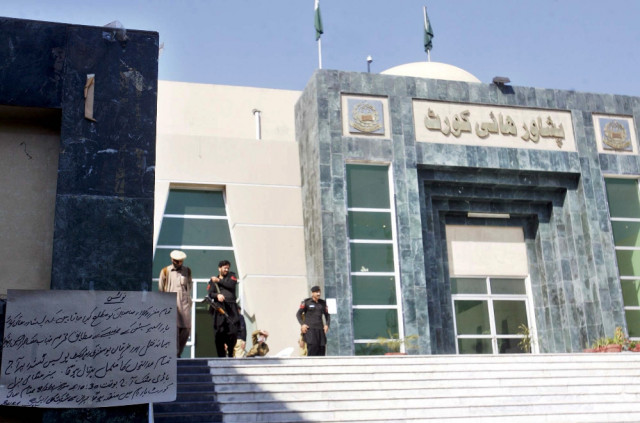
Peshawar High Court. PHOTO: PPI
The Peshawar High Court (PHC) was told on Monday that it can advise the government to present a bill in Parliament which, if passed with a majority, can extend the court’s jurisdiction to the tribal areas.
A larger bench, comprising Chief Justice Mian Fasihul Mulk, Justice Mazhar Alam Miankhel, Justice Yahya Afridi, Justice Qaiser Rashid Khan and Justice Malik Manzoor Hussain, was hearing around 75 petitions of various natures, related to the tribal areas.

However, the focus of the court’s proceedings remained on extending the jurisdiction of the high court to the tribal areas. Arguments on this hot-button issue were presented by a panel of lawyers appointed as amici curiae for this purpose.
Senior lawyer Barrister Zahoorul Haq told the bench the court has jurisdiction in some cases while in many others it does not. The court has the authority to entertain cases related to employees working on deputation in the Federally Administered Tribal Areas (Fata), those appointed on commission and members of the District Management Group.
Zahoor further added the court cannot entertain cases related to employees exclusively recruited for Fata or to those people detained by the political administration in tribal areas.
Advocate Wali Khan Afridi made his case, telling the bench Article 1 of the Constitution defines the territory of the country and clearly states the tribal areas to be part of the country. So if the tribal areas are part of the country then the court can entertain any case related to them, he argued.
“When there is no judicial system in the tribal areas and no institution to safeguard basic human rights then its residents look towards the supreme judiciary for a remedy. Unless Article 247 is deleted from the Constitution, no problems in the tribal areas will be solved,” lawyer Abdul Latif Afridi told the bench.
CJ Mulk remarked even though they consider Fata to be part of the country, the Constitution restrains the judiciary to extend its jurisdiction to the tribal areas. Article 247 sub-section 7 of the Constitution states “neither the Supreme Court nor a high court shall exercise any jurisdiction under the Constitution in relation to a tribal area, unless Majlis-e-Shoora (Parliament) by law otherwise provides.”
When the bench asked for a remedy to the situation, Zahoor informed them that under the law, judges can advise the government to pass a bill extending its jurisdiction to Fata.
The court adjourned all the cases till Wednesday when it will hear complete arguments by the seven lawyers it has asked to assist the court to look into its lack of jurisdiction in Fata.
Clerk jailed for possessing fake documents
In a separate case, an anti-corruption court awarded five years to a junior clerk and imposed a fine of Rs200,000 for receiving huge amounts of money from people on the pretext of giving them jobs in the higher education department.
Some fake documents were found during a high court case related to the education department in 2012. These also contained a fake stay order after which former CJ Dost Muhammad Khan ordered an enquiry against the deputy director of the higher education department, Ghulam Ali, additional director Kala Khan, junior clerks Zubair Sharif and Zamir Hussain, Wapda official Nadeem, and another official Adnan.
Anti-corruption court Judge Fazal Subhan awarded five years imprisonment to junior clerk Zubair Sharif and fined him Rs200,000 after hearing the arguments on Monday. The remaining accused in the case were acquitted over lack of proof against them.
Published in The Express Tribune, March 18th, 2014.












COMMENTS
Comments are moderated and generally will be posted if they are on-topic and not abusive.
For more information, please see our Comments FAQ